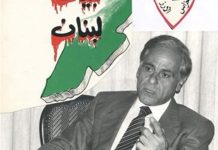We are family
Michael Young/Now Lebanon/January 22/16
With Samir Geagea having endorsed Michel Aoun for the presidency, all eyes are now turned toward Hezbollah. That’s normal, since the party, if it wants Aoun to be elected, will play a key role in persuading the parliament speaker, Nabih Berri, to swing his parliamentary bloc behind the general.
However, one person is looking at the unfolding situation with trepidation: the Druze leader Walid Jumblatt. For over a month Jumblatt was aware that it might take place and was thinking of the consequences. Geagea’s reversal on Aoun has not made him happy. But despite it all, expect Jumblatt to react with greater realism than many of Aoun’s other foes.
For Jumblatt, Christian, particularly Maronite, unity is something potentially threatening. The reason for this, and it’s something most people seem to ignore, is that the Christians are essential to Jumblatt’s power. That may seem counter-intuitive, given his past conflicts with Christian political organizations. However, in a country where the Druze are a small minority, caught between powerful Sunni and Shiite communities, Jumblatt understands that he has to tie his wagon to a Christian community that allows them to project more influence than Druze demographics entitled him to have. If the Christians were to be permanently sidelined, the Druze would soon follow.
However, for Jumblatt to benefit from his Christian alliances he must ensure that the Christians are not unified. The reason is that once that happens, their parties are in a position to impose their preferences on him. That is why Jumblatt is looking ahead to see what is likely to take place if Aoun is elected.
What he sees is that his ability to choose Christian parliamentarians in Aley and the Shouf will be more restricted. Jumblatt has already accepted that his latitude to shape outcomes in Baabda, where a close friend, Ayman Shouqair was often guaranteed a seat, is limited, since the Aoun-Hezbollah alliance created an unbeatable coalition. For Jumblatt to accept further concessions in the mountains does not please him.
Assuming that the next parliamentary elections take place on the basis of the 1960 law, Jumblatt will have one of two choices: to either compete against a joint Aounist-Lebanese Forces list or agree with the Aounists and the Lebanese Forces to form a joint list that includes many of their chosen Christian candidates.
The Shouf is a complicated place. Roughly a third of voters are Druze, a third Sunnis, and a third Christians, so Jumblatt will have to look at the probable voting dynamics to determine his strategy. If the Druze and Sunnis are in agreement, they can together bring in all of Jumblatt’s candidates and almost certainly defeat a Aounist-Lebanese Forces list.
However, there is a downside. If an election is held, the Aounist-Lebanese Forces list defeated by the Druze and Sunnis, and the consequences are that most Maronites feel the Druze leader stifles their desires for legitimate communal representation, then Jumblatt has nothing to applaud. His leadership may gain from Christian discord, but the last thing he wants is to alienate the Christians and undermine a principle pillar of his power.
At the same time, like Nabih Berri, Jumblatt can only project himself as a national figure if he leads a cross-sectarian parliamentary bloc. That is why it is imperative for him to never be seen as merely a minority Druze leader, since he would thus become an emperor with no clothes. This rationale is what makes us suspect that whatever happens, Jumblatt will prefer to lead coalition lists with the Lebanese Forces and Aoun, one in which he would accept their naming a share of Christians. One of the ingredients of a deal for Jumblatt would surely be to ensure that he gets the Druze seat in Baabda back.
Jumblatt’s paradoxical relationship with the Christians is also why the Druze leader is today arguing that Christian unity around Aoun is not something that can be taken lightly and is to be welcomed. This message is probably directed primarily at the Future Movement, which shares with Jumblatt an aversion for Aoun.
What this means is that Jumblatt will lay low for now and allow things to develop. His eye will primarily be on Hezbollah and Nabih Berri, for he knows that what they decide will probably determine whether Aoun wins or not. If the speaker swings toward Aoun, Jumblatt will follow suit, though, like the Future Movement, he may wait for Sleiman Franjieh to withdraw voluntarily first, to avoid humiliating someone who has become a Christian ally.
Jumblatt will be able to console himself in other ways if Aoun wins. Like all political figures the Druze leader has to maintain his patronage network. The political vacuum in the country has prevented the political class from benefiting from state services and state funding, weakening their patronage capacity. A new president, whoever he is, would allow the state to revive itself somewhat, and in that way the politicians would gain.
With Jumblatt things are rarely personal. He tends to absorb his blows and bide his time. If Aoun is elected, the Druze leader will certainly envy Geagea for taking the kingmaker role away from him. But there is no use crying over spilled milk. Jumblatt will continue to deal with the Christians as he knows best, understanding that in many regards he and they are one.
Michael Young is opinion editor of The Daily Star newspaper. He tweets @BeirutCalling.






















